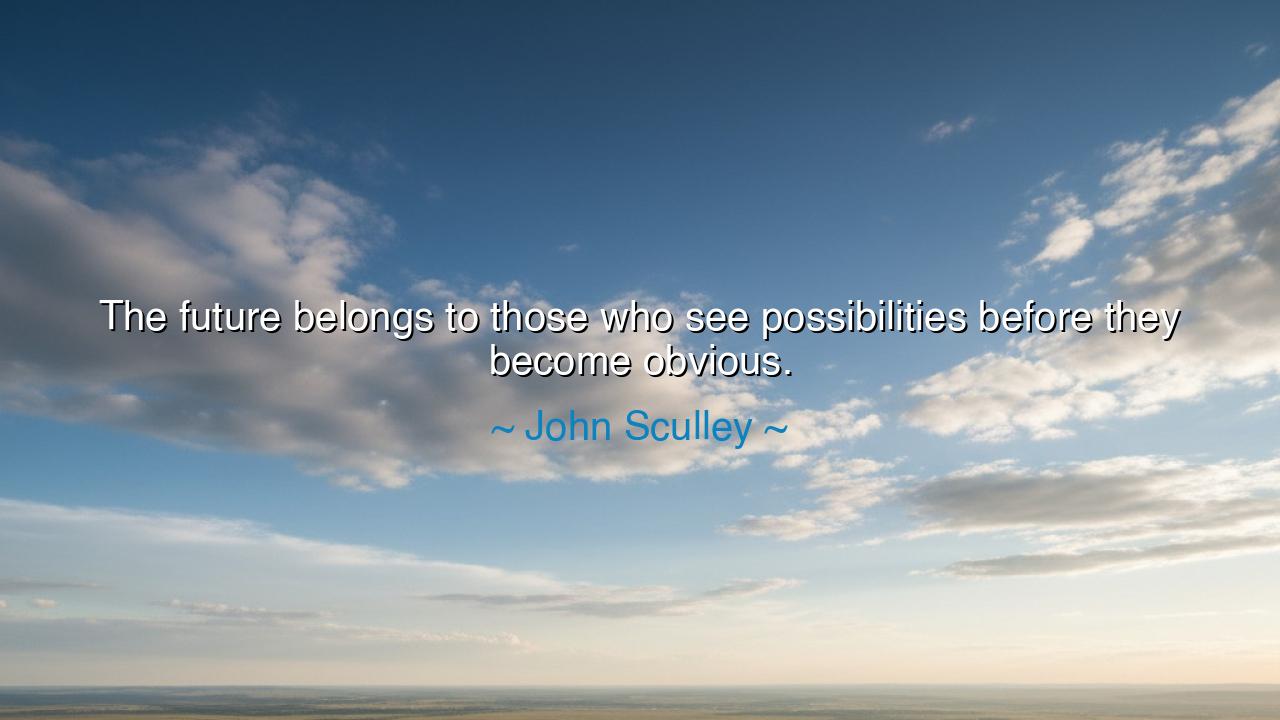
The future belongs to those who see possibilities before they






“The future belongs to those who see possibilities before they become obvious.” These words spoken by John Sculley carry a deep and timeless truth: the future is not shaped by those who wait for the world to reveal its potential, but by those who can foresee what is not yet clear to others. The visionary is not content to follow the path that has been laid before them; instead, they look beyond the present, into the fog of the unknown, and perceive the possibilities that lie hidden there. It is through this insight, this ability to imagine what others cannot, that great change is made.
In ancient times, the prophets, the oracles, and the visionaries were often seen as possessing a divine gift—an ability to see beyond the veil of the present moment. The Greeks revered their philosophers and mathematicians who, like Pythagoras, could envision mathematical truths and concepts before they were even fully understood. These individuals, though often dismissed in their time, were the ones who paved the way for great innovations in science, art, and philosophy. In the same vein, Sculley’s quote reflects the idea that the ability to see possibilities before they are realized is what defines the true leaders, innovators, and changemakers of the world.
Consider the story of Leonardo da Vinci, one of the greatest visionaries the world has ever known. Da Vinci did not merely observe the world around him; he reimagined it. In the 15th century, while others were focused on the constraints of the time, Leonardo was sketching designs for flying machines, studying the anatomy of the human body, and envisioning technologies that would not be possible for centuries. He saw possibilities that the world had yet to understand, and his ideas were far ahead of his time. Though many of his concepts were not realized in his lifetime, Leonardo da Vinci’s work laid the foundation for future discoveries and innovations that would change the course of history.
Similarly, in the 20th century, the legendary Henry Ford saw the possibility of mass production when others were still handcrafting automobiles. Ford’s introduction of the assembly line revolutionized industry, allowing the masses to own cars that were once the domain of the rich. While many saw cars as luxuries, Ford saw them as something accessible to all, and in his vision, he created a future that would shape economies and societies for generations to come. Ford’s foresight did not merely respond to the present; it created a new reality that others could not yet see.
The lesson of Sculley’s quote, and of history, is clear: the future belongs to those who see what is not yet visible to the naked eye. It is those who look at the present and ask themselves, “What could be different? What could be better?” who shape the future. Visionaries like Sculley, Da Vinci, and Ford did not wait for the world to change—they made it change. The future is not a passive inheritance; it is an active creation. Those who see possibilities where others see only limitations are the ones who will leave their mark on the world.
In practical terms, this means that we must train ourselves to think beyond the obvious, to embrace the unknown, and to dream even when the path forward is unclear. It is easy to become trapped in the confines of the present, to only see what is right in front of us. But the truly innovative are the ones who can imagine a different world, a better world, and then set about creating it. Whether it is in business, technology, or social change, we must ask ourselves: What is possible that no one else believes in yet? And then we must have the courage to act on that possibility.
For the modern world, this means embracing entrepreneurship, creativity, and bold ideas. It means fostering a mindset that is not bound by convention or tradition but is driven by the desire to create new paths and explore untapped potential. The future belongs to those who dare to imagine, who look at the status quo and see the possibility for something greater. So, let us all cultivate this vision within ourselves and inspire others to do the same. For in seeing what is not yet obvious, we hold the power to change the course of history.






AAdministratorAdministrator
Welcome, honored guests. Please leave a comment, we will respond soon